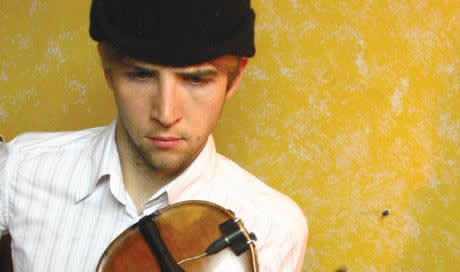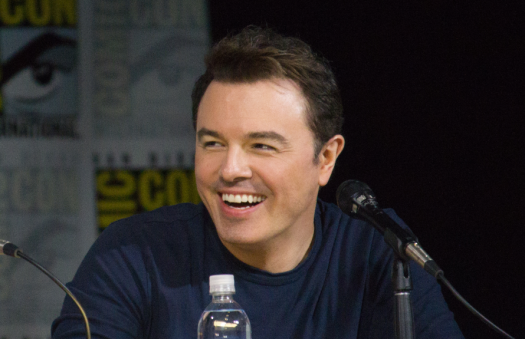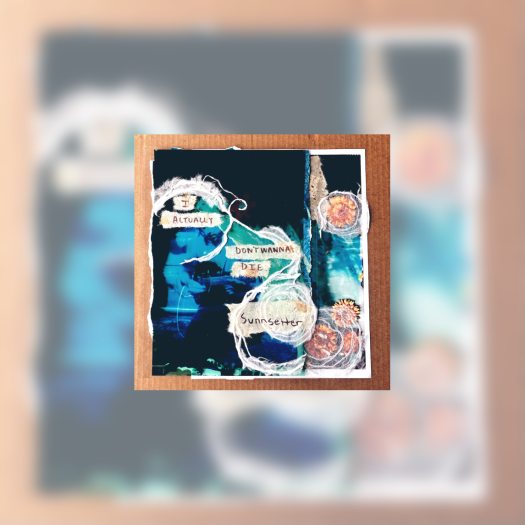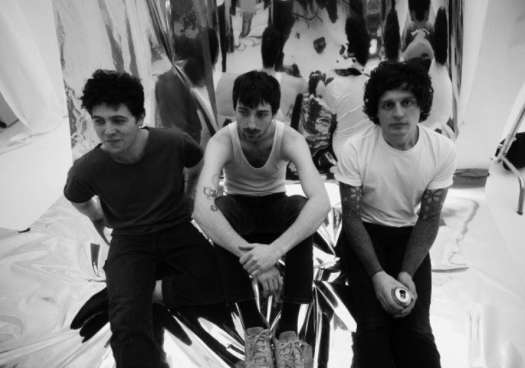It's difficult to find a good violin player. Not because nobody wants to play an instrument that rarely hits the spotlight, or because touring violinists are notorious for leaving a string of bitter lovers in every town, but because years of classical training don't usually lead you into the murky life of indie rock. In the experimentalist indie Torontopia, most people know to hit up Owen Pallett. Noticed most often as the lanky and charming violinist for the Hidden Cameras and sometimes the Arcade Fire, Owen's been picking and bowing his way through a series of Toronto acts since he got here. "Viola in Picastro, violin and keyboards in Royal City, guitar in Les Mouches and Tenderizer, violin in the Jim Guthrie Band, keyboard in King Tut, sing in Internet," he lists his inclusions endlessly, but most recently it's "violin and singing in Final Fantasy."
The Final Fantasy project came about while Owen was starring in the angelic lump of weirdoes called Les Mouches, where he learned about looping from fellow Mouches Matt Smith. "The looping idea is just copped from Matt and I've since found out there are a couple other violinists in the world who do an identical thing, namely Andrew Bird." Since its inception, the project has grown a wildly praiseworthy following and Final Fantasy has just released its first disc, Has A Good Home. Though it comes off as big and complicated, it's really just Pallett writing songs, looping parts and plucking violin over them with the addition of his hushed, choirboy-style vocals that betray his weird inner world with lyrics about spirits who climb to the top of the CN tower.
Pallett's history in musical education is a similar trick in complicated simplicity. "I started playing violin when I was three. My older brother played cello and my mom said, Do you want to do something like that?'" His child prodigy status was tripped up a little though. "I stopped playing violin in high school because it was leaving a mark on my neck, and this one kid at school would make fun of me. I started playing a lot of piano and trombone. Then I got braces so that ended the trombone experience."
Pallett's musical credentials extend their tentacles far. "I started playing violin in Milton, Ontario in various Celtic-y and country bands. The first serious' rock band I played with was my own solo material, which would later become Les Mouches. I don't think I ever really understood music-making until I heard Xiu Xiu in early 2002. All of a sudden I understood why I loved the Smiths but hated the Stone Roses, and why the concept of singer-songwriter' was flawed." It's not that Pallett made a transition from classical violin player to indie rock virtuoso, it's that the culmination of his musical experiences arrived there.
It is inaccurate, however, to describe Pallett as "self-taught." Learning from only one teacher from his beginning at the age of three up until a college-ready 18 was an experience that Pallett says "essentially screwed up my education as a violinist." Switching violin teachers is key and failing to do so is routinely met with criticism and mockery. "You're supposed to switch teachers, because teachers are incomplete," Pallett explains. "It's like being with a lover. If you go to your lover and you're like, What do you think I can do to improve myself?' and they're like Well, you've kind of got to work on these crow's feet,' so you keep moisturising, but the crow's feet are still there and after a while all the lover can see is your crow's feet. You go to another teacher and they're like Oh my god, where are your biceps? You gotta go to the gym!'"
The equipment itself is a less traumatising story. Pallett plays a 125-year-old no-name Czech violin. "I've done a lot of experimenting with different kinds of violins and I've come to realise that there's really only one option when it comes to playing violin live. You have to play an acoustic violin. You cannot play an electric violin or you'll sound terrible." But in the studio, things are a little more complex. "I would never ever loop my violin [in the studio]. I record the violin separately and acoustically. I've been trying for a long time to get a good violin sound in the studio, but it's always difficult," he explains. "I use an AKG414 microphone and it works fantastically. What I often do to get a string orchestral sound is record it very close and play very quietly and change the EQ on the preamp through all these different frequencies as I record track after track and it gives these big, nice sounds. To get a kind of a Motown sound, what I'll usually do is record it like that and then put it back through an amp so it has a bit of distortion on it to make it sound like Stand By Me.' A little bit like a dart on a dartboard."
The Final Fantasy project came about while Owen was starring in the angelic lump of weirdoes called Les Mouches, where he learned about looping from fellow Mouches Matt Smith. "The looping idea is just copped from Matt and I've since found out there are a couple other violinists in the world who do an identical thing, namely Andrew Bird." Since its inception, the project has grown a wildly praiseworthy following and Final Fantasy has just released its first disc, Has A Good Home. Though it comes off as big and complicated, it's really just Pallett writing songs, looping parts and plucking violin over them with the addition of his hushed, choirboy-style vocals that betray his weird inner world with lyrics about spirits who climb to the top of the CN tower.
Pallett's history in musical education is a similar trick in complicated simplicity. "I started playing violin when I was three. My older brother played cello and my mom said, Do you want to do something like that?'" His child prodigy status was tripped up a little though. "I stopped playing violin in high school because it was leaving a mark on my neck, and this one kid at school would make fun of me. I started playing a lot of piano and trombone. Then I got braces so that ended the trombone experience."
Pallett's musical credentials extend their tentacles far. "I started playing violin in Milton, Ontario in various Celtic-y and country bands. The first serious' rock band I played with was my own solo material, which would later become Les Mouches. I don't think I ever really understood music-making until I heard Xiu Xiu in early 2002. All of a sudden I understood why I loved the Smiths but hated the Stone Roses, and why the concept of singer-songwriter' was flawed." It's not that Pallett made a transition from classical violin player to indie rock virtuoso, it's that the culmination of his musical experiences arrived there.
It is inaccurate, however, to describe Pallett as "self-taught." Learning from only one teacher from his beginning at the age of three up until a college-ready 18 was an experience that Pallett says "essentially screwed up my education as a violinist." Switching violin teachers is key and failing to do so is routinely met with criticism and mockery. "You're supposed to switch teachers, because teachers are incomplete," Pallett explains. "It's like being with a lover. If you go to your lover and you're like, What do you think I can do to improve myself?' and they're like Well, you've kind of got to work on these crow's feet,' so you keep moisturising, but the crow's feet are still there and after a while all the lover can see is your crow's feet. You go to another teacher and they're like Oh my god, where are your biceps? You gotta go to the gym!'"
The equipment itself is a less traumatising story. Pallett plays a 125-year-old no-name Czech violin. "I've done a lot of experimenting with different kinds of violins and I've come to realise that there's really only one option when it comes to playing violin live. You have to play an acoustic violin. You cannot play an electric violin or you'll sound terrible." But in the studio, things are a little more complex. "I would never ever loop my violin [in the studio]. I record the violin separately and acoustically. I've been trying for a long time to get a good violin sound in the studio, but it's always difficult," he explains. "I use an AKG414 microphone and it works fantastically. What I often do to get a string orchestral sound is record it very close and play very quietly and change the EQ on the preamp through all these different frequencies as I record track after track and it gives these big, nice sounds. To get a kind of a Motown sound, what I'll usually do is record it like that and then put it back through an amp so it has a bit of distortion on it to make it sound like Stand By Me.' A little bit like a dart on a dartboard."




